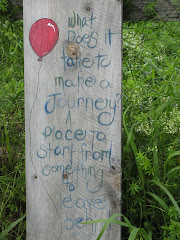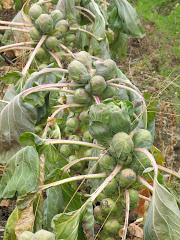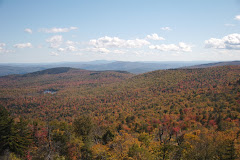At the end of the season the contrasts I love about the day-to-day work of farming are more defined. They’re sharper and harder, like the wind and the sunsets that grace our days in fall. There is always life and death in one day on a farm. But at the end of the season the dance is faster and brighter. I spent one golden afternoon this week laying row-cover over a field of tender greens to keep them warm as the sun wanes and the days get colder. I hooped and covered seven longs beds of baby spinach, mustard greens, kale, and arugula. When the wind blows through those tunnels of fabric it dances like a rodent running. In the fall we work hard to save what we can. We’re tender toward the crops. We cover the basil every night, the way a mother puts her child to sleep. Someone goes out there at sunset after we’ve closed the stand and puts the white blanket back over the long green stand of that fragrant herb. We’ll harvest what’s left of it and then till it in at the end of the week, but until then, we cover it up each night before we turn away to our own beds.
The other half of our work in the fall is destruction. Yesterday we spent all afternoon taking down the tomatoes. First we cut the twine away from the stakes. As soon as the support is gone, the dead vines fall into the earth. Then we pull out each neat row of stakes, one by one, until the field is left desolate and without order. I love taking down tomatoes. I seeded those in the greenhouse one late morning in the spring when the sunshine was just starting to warm my blood and my muscles were aching for the blessing of long days outside. I planted them in the hot sun of early summer. I weeded them more than once. I staked them and tied them. I spent hours harvesting them on countless afternoons and endless mornings. All summer I put the work of my hands and my heart into those tomatoes. I ate them raw in the field and simmered them down into a mess of red and golden sauce that tasted like soil and rain, like the sweet fragrance of morning and the warmth of home. All summer those vines have been producing their red and green and orange fruit. It is the middle of October. This morning there was ice draped over the broccoli. The tomatoes are done. We’ve got a few trays of mostly green ones back at the stand. Customers look at them and say, “This is the end of the tomatoes, isn’t it? It’s so sad, I just don’t know what I’m going to do!” They pout at me like I’ve broken their heart and I don’t have any sympathy. I know how they feel. It’s the end of the season and I’m sad too. I hate the day when I have to go back to the grocery store to buy kale and beets. But it’s the middle of October. This is what happens in the world. There’s life and there’s death. I’ve been eating those juicy red orbs for more than three months. Summer ends, and plants die. That’s the way it goes. Daylight fades into night and the moon waxes and wanes and waxes again. Tomatoes need heat but broccoli loves the cold. I’ve been eating tomatoes for three months. I’ll go almost nine without them. Yes, I’m sad, but this is what happens every year. It’s the middle of October and I’ve earned the right to tear town that tomato twine and yank those stakes out of the ground.
The fall hardens something in me. There is sadness in the falling leaves and the early darkness, but there is also relief. It’s been a long season and farming is hard work. We take longer breaks in the morning and the sunset forces us away from the farm at six. The house is warm. I’ve been eating a lot of soup. I love covering up the young mustards and spinach with row-cover to keep them warm. I love the way it feels walking back from the far field, the sun a bleeding golden line behind heavy clouds that might mean rain in the summer but in the fall merely mean, heaviness, knowing that the basil is tucked snug into the white fabric, knowing that the frost that is sure to come with the cold, clear night will only nip the few plants peeking out from under that net of safety.
I also love watching the dead tomato vines fall helpless to the spent field. I love the way the row of dead cornstalks up at Greenpower speaks its own language of sadness and necessity. I love the feeling of working a weathered tomato stake out of the ground, of the coarse wood grating on my hands and the movement of the wind along my arms as I toss it onto the growing pile of stakes atop the mess of rotting tomatoes and blackened plants. We live in a world where things live and die. It is not comfortable. I do not know what to do with death. I don’t want to leave the sunlight and the way my breath goes out of my body in the morning and takes its own shape against the cold air. I don’t want to leave the voices of the people I love and the movement of my legs and my shoulders as I walk down a bed, shoveling compost. But I love this world anyway, death and all. Tomato plants have lives, and so do the hornworms that eat them, and so do people.
Recently I’ve been thinking about the colors that define the cycles of seasons, about the openings and closings and cuttings of sorrow and joy that define the way we move through our lives, about how far we’ve cut ourselves off from the truth of how things grow and go back into the ground. I don’t want to love anything in pieces anymore. If you want to be a farmer you have to learn to walk with death. There is a silence that grows in me with the fall, a silence made of the toppled tomato plants and the young mustards struggling to live despite the dark days and the cold mornings. Broccoli loves the cold and frost makes carrots sweeter. Everything on this earth is stitched together with miracle. There are birds that overwinter in New England so small they have to move and eat constantly in order to stay alive. The tomatoes are gone now, but I have harvested Brussels sprouts on days so cold they burned our hands through our thick gloves and frosted our exposed eyebrows. Everything on this earth is stitched together with miracle. Everything we plant in the spring on the hard back of promise eventually dries up, hardens, dies. This is the world we live in. It isn’t comfortable. But I don’t want to love anything in pieces anymore. There isn’t space or time for broken love in this aching, tired world.
I only want to love what is whole, and things that are whole are born, and live, and die. Things that are whole have faces and tell stories. Things that are whole can weather storms, they’re built to last. I love red onions and broccoli made brighter by the ice crystals that shone on my hands as I harvested it in the cold morning. I love wet ink that dries on the page and spells out poems. I love the space between my two shoulder blades as I toss a shovelful of compost onto the field, compost stitched together with death. All day as I go about my work I toss things onto the compost pile: wilted carrot tops, rotten tomatoes, cornhusks. Those things decompose. The carrot tops and the flimsy eggplants break down, fall apart, become one. This morning we moved down the field tossing that rich, dark blessing onto the bed where we’re planting garlic. I don’t want to love things in pieces anymore. The hope in planting is obvious. Putting a seed into the ground is the ultimate act of faith. But that hope begins long before I bend over in the field and drop that garlic clove into the earth. It’s the death of something else that nurtures that seed and makes it grow. I loved the smell of the compost we shoveled onto the beds this morning, and the texture of it, dark and crumbling and of the earth. It was warm under the sun and my muscles were working fast, and later, alone under the blue arc of the sky, I bent down and planted pink-edged cloves of garlic into that dark, nutritious earth.
There isn’t any other prayer I know how to pray. I only want to love things that are whole. Everything in the world breaks down, crumbles, gets so small it wants to curl inside itself and disappear. Nothing in the world lasts unhinged and untarnished. Being whole is not the same as being brand new and never broken. Farming is just one big, complicated mess. Whole, dark, fragrant compost is only the broken ribs and seeds of dead vegetables. There is death everywhere in the fields these days, and there is also the sweetest, tenderest push for life. There cover crops that overwinter blue and shining, that sing their plant song all winter to the snow and the lonely wind. When the trees lose their leaves their nakedness opens up the forest into shapes you never knew where there. Everything that is whole is stitched together with the broken bits of something else.
I don’t want to love things in pieces anymore. The fall hardens my heartbones, opens my face, sets my hands singing. It’s the middle of October and I’ve earned the right to love the simple pleasure of watching those tomatoes topple as I slash through their support with a sharp knife. The season is curling up, tightening, getting smaller. I’m loving the tender mustard greens with all my muscle. I’m loving them whole and young. I’m loving the frost on the broccoli and the way the sunlight blasts over the fields just before it disappears at dusk. I’m loving these things with my whole and chipped-off body, with the nicks in my fingers from the harvest knife and the scars on my heart and the palms of my hands. I’m loving the kale and the butternut squash and the death that sits heavy and whole in their dark centers. Everything in this world is stitched together with miracle and death. I’m loving the blazing red leaves and the decaying tomatoes and the brown cornstalks strung like signposts to winter against the hard blue sky. I’m loving these things with my whole, broken body and the weight of it is an ache to too deep and too blue and too stained with the stories of bone and muscle to write down in ink.
Saturday, October 20, 2007
Subscribe to:
Post Comments (Atom)





































































1 comment:
I found this entry rousing.
It seems like you are coming in touch with what it means to truly be part of the land.
Post a Comment